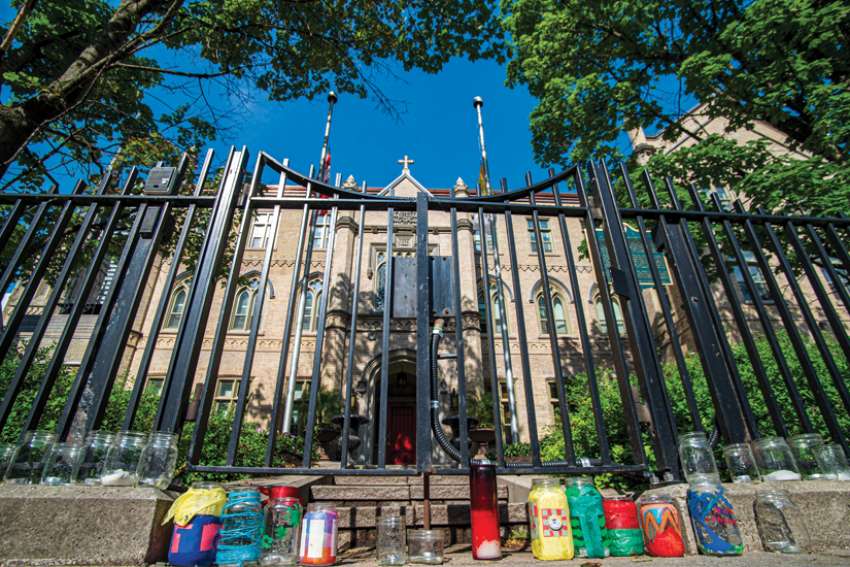The two large urban dioceses in the Golden Horseshoe of southern Ontario are committed to raising one-third of the $30 million, five-year pledge Canada’s bishops made in September to fund Indigenous reconciliation and healing projects.
The Archdiocese of Toronto and the Diocese of Hamilton will raise a total of $10 million — $6 million from Toronto and $4 million from Hamilton — for the Canadian bishops’ Indigenous Reconciliation Fund. Neither diocese operated or had residential schools within their boundaries, but both say the issue is national and transcends questions of who actually ran the schools.
“The Archdiocese of Toronto did not operate any residential schools, but we see advancing reconciliation as a national effort,” said an emailed statement from interim communications director Mark Brosens.
In a letter to Steeltown Catholics, Bishop Doug Crosby said there were important reasons why the diocese wanted to contribute to the fund and to reconciliation.
“We take seriously our part in supporting the CCCB effort to promote healing and reconciliation with our Indigenous sisters and brothers,” Crosby said. “The Church stands with those who suffer, those who mourn and those who hunger for righteousness.”
Though Ukrainian Catholics had no involvement in running Canada’s system of 139 Indian residential schools over a century, Edmonton Eparch David Motiuk was glad to commit his diocese to $100,000 for healing and reconciliation.
“Even though we weren’t part and parcel of residential schools, I think we can be part of working together for greater unity,” Motiuk told The Catholic Register. “One hundred and thirty years ago, when Ukrainians began immigrating to Canada, there existed a sacred bond between our peoples. If it weren’t for the Indigenous peoples we wouldn’t have survived those first winters. We wouldn’t know which medicines would have healed us. We wouldn’t know the lay of the land, how to get around, what crops are going to be best suited. So the Indigenous people reached out to us.”
Money raised in and around Canada’s financial capital and industrial heartland won’t necessarily be spent there. The Archdiocese of Toronto is taking steps to ensure money goes where it’s needed, said Brosens.
“We will be considering reconciliation project opportunities from both within our diocese and in other dioceses that have access to less money than we do,” he said.
Nine out of 73 Roman Catholic dioceses and five Ukrainian Catholic eparchies across Canada have pledged two-thirds of the $30-million total. Toronto, Hamilton, Winnipeg, St. Boniface, Regina, Saskatoon, Edmonton, the Ukrainian Catholic Eparchy of Edmonton and Vancouver have collectively committed to $20.1 million.
The financial commitments are irrevocable. If dioceses can’t raise the money from parishioners they will find it elsewhere — in reserves or from asset sales.
All dioceses have made commitments for specific funding targets to the Canadian Conference of Catholic Bishops, but it’s up to individual dioceses whether they make their commitments public, said CCCB spokesperson Jonathan Lesarge.
If the remaining $9.9 million were divided equally between all the dioceses that haven’t announced commitments, it would come to a little more than $140,000 per diocese.
The Archdiocese of Regina has already raised $720,000 and committed a similar amount for a total of $1.5 million available now to fund projects. Over the five years, Regina is committed to raising $2 million.
Regina’s Truth and Reconciliation Committee is talking with local Metis and 25 First Nations communities that fall within its borders. Regina’s to-do list includes survivor-directed work on cemeteries at former residential school sites, language recovery and support “that recognizes and validates the spiritual life and practice of Indigenous peoples.”
In Saskatoon a “Discernment Circle” is establishing a board that will allocate and distribute the $1.25 million the diocese has committed to raising.
The Archdiocese of Vancouver raised more than $400,000 in a special collection last September and is committing $2.5 million.
In Edmonton, Archbishop Richard Smith framed the archdiocese’s $3-million commitment in terms of overcoming “deep division and wide polarization” in Canada.
“We can demonstrate clearly that reconciliation of the heart and right relationships is not only possible but also can become a reality in our very day,” Smith said in a letter to Edmonton Catholics.
There were 26 residential schools in Alberta. Two of them fell within the modern boundaries of the Archdiocese of Edmonton.
Only one diocese in Quebec and Atlantic Canada has announced funding commitments. The Diocese of Amos has pledged $30,000.
Quebec’s assembly of Catholic bishops general secretary Msgr. Pierre Murray insists that the CCCB’s $30-million commitment is the CCCB’s affair. Dioceses in Quebec have sent their commitments to the CCCB’s Ottawa office, but how the campaign will be managed and public announcements about it are up to the national conference.
Some dioceses told The Catholic Register they expected an announcement during the Quebec bishops’ March plenary meetings, but Murray knows of no plans to address the subject.

